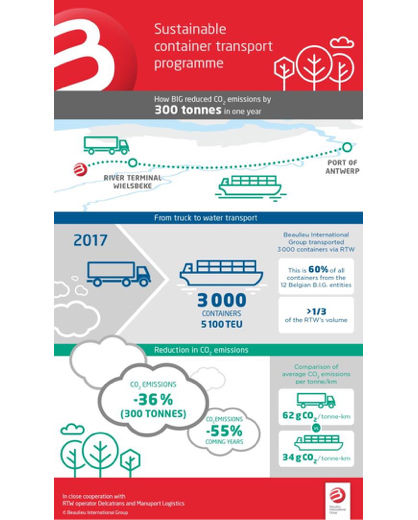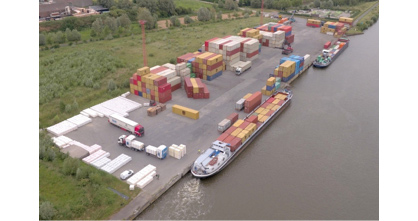Sustainability
Beaulieu International Group reduces CO2 emissions
Since the start of the programme in 2015, it has grown substantially and now 60% of B.I.G.’s output by container is transported via barges starting at the River Terminal Wielsbeke (RTW). The RTW acts as B.I.G.’s global inland hub, connecting the company to major shipping routes and destinations around the world via the Port of Antwerp. The container transport organisation has been set up in close cooperation with RTW operator Delcatrans, who provides barge transport services, and Manuport Logistics, who acts as 4 PL (Fourth Party Logistics) partner for B.I.G..
Previously all container cargo went by truck to the Port of Antwerp, a distance of 90 km. By changing to water transport, journey times have become more reliable as traffic congestion doesn’t have to be factored in; there are fewer trucks on the roads reducing traffic for other road users; and the company’s CO2 emissions have fallen. In 2017 the company shipped 3,000 containers via combined road + barge transport, reducing CO2 emissions by 300 tonnes, compared with pure road transport.
“B.I.G. is committed to providing efficient and sustainable transport solutions,” explains Isabelle Vandamme, Group Supply Chain & Procurement Director, B.I.G.. “That’s why barge transport from RTW to the Port of Antwerp is so important for B.I.G. and will continue to be so in the coming years. In fact, our target is to increase barge use by 10% this year and barge capacity is planned to increase from 60 to 90 TEU (Twenty-foot Equivalent Unit) in the coming years.”


The advantages of shipping by barge in facts and figures:
- Comparison of average CO2 emissions per tonne/km: road transport 62gCO2/tonne-km, versus intermodal road/barge 34gCO2/tonne-km.
- Beaulieu International Group transported 3,000 containers via RTW. This is 60% of all containers from the 12 Belgian B.I.G. entities.
- RTW handled 15,000 TEU via barge in 2017. 5,100 TEU from B.I.G. – more than a third of the RTW’s volume.
- With more than 72 million tonnes, a record volume of goods was transported on the Flemish waterways in 2017. This is an increase of 6.5% on the previous year. In terms of containers, a new top performance was achieved with 832,000 TEU – an increase of 11.5% on 2016.

